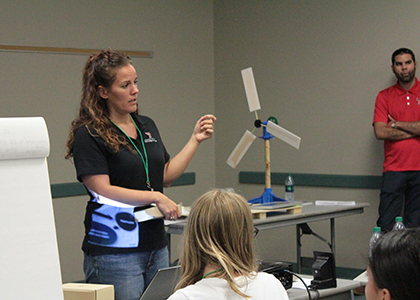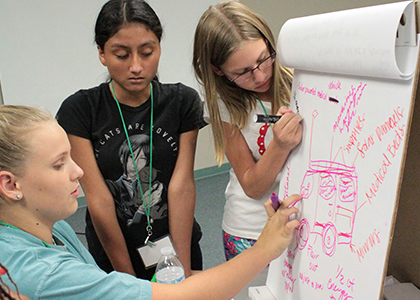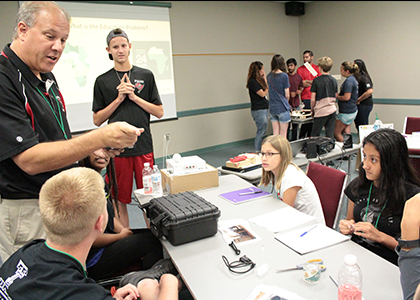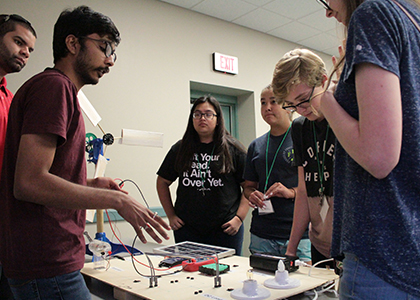
 According to data from the National Centers for Environmental Information, the United States has sustained 233 weather and climate disasters since 1980, the
total cost exceeding $1.5 trillion. With these disaster situations affecting millions
of people worldwide, it is not surprising that disaster preparedness has become a
popular topic of discussion across the globe. Twenty middle and high school students
from the Lubbock area recently joined the conversation and took part in, "The Perfect
Storm Camp," designed to spark innovation, creativity, and quick-thinking in disaster
situations.
According to data from the National Centers for Environmental Information, the United States has sustained 233 weather and climate disasters since 1980, the
total cost exceeding $1.5 trillion. With these disaster situations affecting millions
of people worldwide, it is not surprising that disaster preparedness has become a
popular topic of discussion across the globe. Twenty middle and high school students
from the Lubbock area recently joined the conversation and took part in, "The Perfect
Storm Camp," designed to spark innovation, creativity, and quick-thinking in disaster
situations.
Hosted by multiple disciplines from Texas Tech University, Texas Tech Health Sciences
Center and Covenant Health, the week-long camp allowed students to familiarize themselves
with disaster situations such as hurricanes, tornadoes, fires, and even chemical spills.
Each day, students covered different topics, technologies, and tools that could be
useful in the event of a natural disaster.
 "In many situations, especially disasters and the aftermath, there are a host of difficult
challenges including missing or disabled resources," explained Tim Dallas, Professor
of Electrical & Computer Engineering and Associate Dean of the Texas Tech Graduate
School. "It is important that people are able to improvise solutions using less than
sufficient knowledge and materials than what they have available."
"In many situations, especially disasters and the aftermath, there are a host of difficult
challenges including missing or disabled resources," explained Tim Dallas, Professor
of Electrical & Computer Engineering and Associate Dean of the Texas Tech Graduate
School. "It is important that people are able to improvise solutions using less than
sufficient knowledge and materials than what they have available."
In an effort to showcase actual innovative technologies that have been developed at
Texas Tech, Dallas brought along one of his own inventions. Designed for use in disaster
settings or environments with limited access to power, the solar-powered digital classroom
in a box utilizes solar panels to power a projector and digital course materials for
teachers or other educational providers.
The camp was largely funded by grants from the VentureWell Foundation and the Global
Laboratory for Energy Asset Management and Manufacturing (GLEAMM), allowing camp organizers
to bring students with diverse backgrounds together under one roof. The VentureWell
Foundation is a non-profit organization on a mission to solve the world's biggest
challenges by cultivating a pipeline of inventors, innovators, and entrepreneurs.
With a similar mission, GLEAMM is focused on building collaborations and developing
technologies relevant to renewable energy.
With many of the sessions relating to sustainability and renewable energy, students
were encouraged to think outside of the box when planning for a disaster.
"During one exercise, we asked students to think about the various areas of medical
and engineering devices that are used during natural disasters, " explained Kelli
Frias, Assistant Professor in the Marketing and Supply Chain Management Department
in the Rawls College of Business. " In just a short amount of time, one particular
group of students developed a medical triage van powered by solar energy. The van
was furnished with important triage equipment and solar panels to generate power should
the area be without. We were very excited to see their ideas at work!"
Local EMS professionals were also on hand throughout the week to demonstrate a variety
of medical techniques that would be crucial in the event of a real-life natural disaster.
"Students focused on learning the basics, airway breathing circulation, how to manage
the priorities in a disaster and how to innovate around a solution when they don't
have enough of the equipment," said Dr. Annette Sobel, Adjunct Professor in the Texas
Tech Electrical & Computer Engineering Department.
 The camp concluded with a simulated disaster situation that allowed the students to
put what they had learned throughout the week in to action, developing inventions
and solutions with limited supplies.
The camp concluded with a simulated disaster situation that allowed the students to
put what they had learned throughout the week in to action, developing inventions
and solutions with limited supplies.
"Our mission with the Perfect Storm Camp was to teach students some introductory concepts
in medicine, renewable energy, engineering, and product development with a focus on
generating new inventions that will improve wellbeing in natural disasters," said
Frias.
